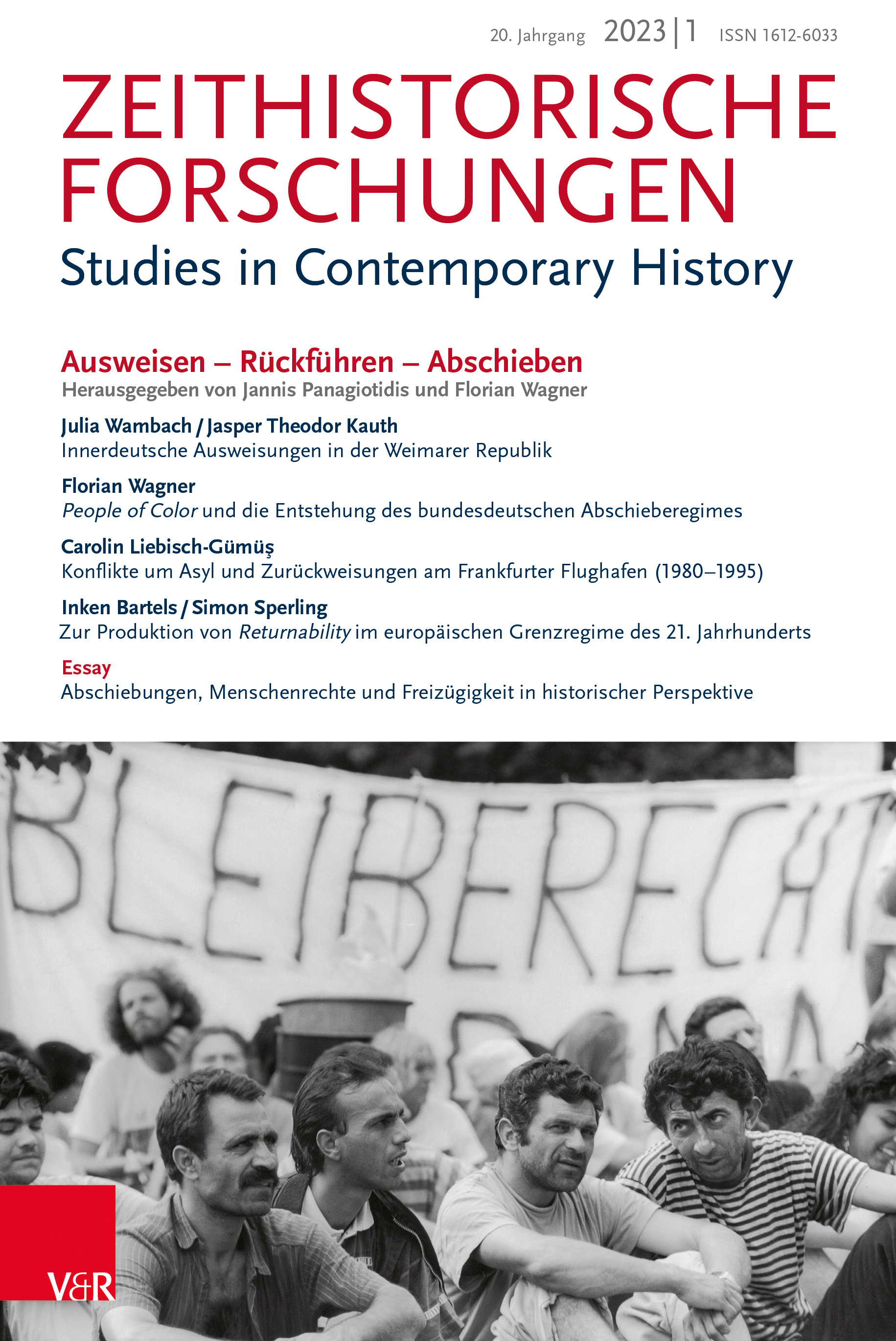Heft 1 / 2023
Aufsätze | Articles
Abgeschoben aus dem eigenen Land
Innerdeutsche Ausweisungen in der Weimarer Republik
AbstractAusweisungen können weitere politische Funktionen einnehmen, die über die staatliche Steuerung von Migration hinausgehen. Wie wir in diesem Aufsatz anhand zweier Sondertypen von Ausweisungen zeigen, können solche Maßnahmen gerade in Phasen staatlicher Konsolidierung und bei der Überlappung von Souveränitätsansprüchen als politisches right-peopling auftreten. In diesem Kontext untersuchen wir die Rolle von Ausweisungen während der kritischen Phase der deutschen Nationalstaatsbildung nach dem Ersten Weltkrieg. Für die 1920er-Jahre analysieren wir einerseits Ausweisungen von Deutschen aus anderen Landesteilen durch deutsche Landesbehörden (etwa von Württembergern aus Baden), andererseits Ausweisungen von Deutschen aus dem besetzten Rheinland durch die alliierten Besatzungsbehörden. Mit Bezug auf aktuelle Debatten um Illegalisierung und deportability von Migrant*innen betrachten wir Beispiele aus regional- und rechtshistorischen Quellen der Weimarer Republik. So zeigen wir, wie Ausweisungen sozialpolitische und ethnisch-exklusive Ziele hatten, aber auch zu einer Stärkung staatlicher Institutionen und zu einer nationalistischen Identifikation mit dem Deutschen Reich nach dem verlorenen Krieg führten.
* * *
Deported from Their Own Lands.
Expulsions Within the Weimar Republic
Expulsions not only assume key roles in states’ efforts to control, regulate, and channel migration movements; they also have a variety of additional political functions. In this article, we examine two particular expulsion practices and show that they are used in processes of political ›right-peopling‹, especially in times of state consolidation and competing claims of state sovereignty. In this context, we investigate the role of expulsions in the crucial phase of German nation-building following the First World War. Our analysis of expulsion practices in interwar Germany focuses on the expulsions of Germans from individual German states by regional authorities (e.g. Wuerttemberg Germans who were expelled from Baden) as well as on expulsions of Germans from the occupied Rhineland ordered by the Allied occupation authorities. We assess regional and legal sources from German archives through the lens of current debates on the illegalisation and ›deportability‹ of migrants. Drawing on case studies, we show that expulsions were used not only to realise socially and ethnically exclusionary policies but also to stabilise state institutions. We argue that the reaction to some of these practices led to a new nationalist identification with the German Reich of the Weimar Republic.Ausweisungsgrund: »Außereuropäisch«
People of Color und die Entstehung des bundesdeutschen Abschieberegimes
AbstractDas westdeutsche Abschieberegime entstand im Kontext der Problematisierung von People of Color, die seit 1950 in die Bundesrepublik einreisten, um dort ein Studium oder eine Ausbildung aufzunehmen. Die junge Republik lud Menschen aus sich dekolonisierenden Ländern zunächst ein, um sich von der Rassenideologie des Nationalsozialismus zu distanzieren und sich gegenüber dem Sozialismus zu profilieren. Dabei bestand jedoch weiterhin die im Kern völkische Prämisse, dass People of Color nicht langfristig bleiben sollten. Die Herstellung ihrer Rückführbarkeit manifestierte sich in der Rechts-, Verwaltungs- und Betreuungspraxis lokaler Behörden und Wohlfahrtsverbände, wodurch diese Prämisse in das Ausländergesetz von 1965 einging. Das Gesetz machte insbesondere »außereuropäische« Migrant*innen abschiebbar, denen es pauschal kriminelle Täuschungsabsichten und extremistische Politisierung unterstellte. Es verrechtlichte zudem eine pseudomoralische Rückkehrpflicht von People of Color unter Verweis auf ihren Entwicklungsauftrag in den Herkunftsländern und auf tradierte Geschlechterrollen. Diese Normen waren in der Bundesrepublik permanent abrufbar und wurden sukzessive auf andere Migrant*innen angewandt.
* * *
No Place for ›Non-Europeans‹.
People of Color and the Birth of West Germany’s Deportation Regime
West Germany’s deportation regime emerged in the 1950s and 1960s, when people of color migrated there to graduate from West German universities and receive vocational training. Distancing itself from the Nazis’ racial ideology and styling itself a liberal alternative to socialism, the young Federal Republic initially invited people from decolonizing countries. However, the substantially völkisch idea persisted that people of color could never belong to the Federal Republic and should leave the country sooner rather than later. The ensuing construction of their returnability manifested itself in juridical, administrative and aid practices shaped by local authorities and welfare associations, and found its way into the Aliens Act of 1965. This law made ›non-European‹ migrants, in particular, deportable by declaring them collectively fraudulent, politically radicalized, and therefore criminal. At the same time, the Aliens Act evoked a pseudo-moral duty of return to develop their countries of origin, and referred to traditional gender roles to deport female partners. These norms remained anchored throughout in West Germany’s history and were successively applied to other migrants.Im Drehkreuz
Konflikte um Asyl und Zurückweisungen am Frankfurter Flughafen (1980–1995)
AbstractDer Aufsatz beleuchtet einen von der migrationsgeschichtlichen Forschung bisher vernachlässigten Raum und seine Akteure: den Flughafen. Der Frankfurter Flughafen ist von besonderem Interesse, weil er sich zum größten Transitdrehkreuz in der Bundesrepublik entwickelte und seit den 1980er-Jahren auch ein Experimentierfeld für den Umgang mit Asylbewerber:innen wurde. Im Zentrum stehen die Positionen und Konflikte von Akteur:innen, die in Asylfälle und Zurückweisungen am Flughafen involviert waren – allen voran der Bundesgrenzschutz, der Flughafensozialdienst und die Migrant:innen selbst. Gezeigt werden zum einen die Folgen übergeordneter Politiken im konkreten Raum. Zum anderen offenbart die lokale Konfliktgeschichte auch Entscheidungs- und Handlungsmöglichkeiten im komplexen Grenzraum der Transitzone, die wiederum auf größere politische Zusammenhänge und Regulierungsversuche wie das Flughafenasylverfahren zurückwirkten. Deutlich wird außerdem, dass Zurückweisungen an der Grenze und Abschiebungen/Zurückschiebungen aus dem Inland nicht immer klar zu trennen sind.
* * *
Descent into the Hub.
Disputes over Asylum and Forced Returns at Frankfurt Airport
The airport is a neglected space in research on the history of migration. The article sheds light on this space, its characteristics, and the various actors involved with a focus on Frankfurt Airport. This airport developed into the largest transit hub in the Federal Republic of Germany and, since the 1980s, has become a testing ground in terms of how asylum seekers are dealt with. The article zooms in on the divergent positions of, and conflicts between, the various actors involved in asylum cases and refoulement (forced returns) at the airport; mainly the Federal Border Police, the Airport Social Services (Flughafensozialdienst), and the migrants themselves. It reveals how broader immigration policies played out on the local level in the complex border space that was the airport transit zone. Furthermore, it shows how, in turn, local actors and developments had an impact on policy-making and regulations at the state level, such as the Airport Asylum Procedure. Finally, the article challenges readers to question the common distinction between people being sent back at the (airport) border and deportations from within the country.Erzwungene Freiwilligkeit
Zur Produktion von Returnability im europäischen Grenzregime des 21. Jahrhunderts
AbstractKämpfe um Rückführungen prägen das europäische Grenzregime des 21. Jahrhunderts. Wie wir mit dem Konzept der Rückführbarkeit (Returnability) herausarbeiten, kommen dabei »sanfte« Instrumente der sogenannten Rückkehrförderung ebenso zum Einsatz wie gewaltsame Abschiebungen. Diese werden von migrantischen Widerständen herausgefordert. Zentrale Auseinandersetzungen in diesem Rückführungsregime analysieren wir im Zentrum der Europäischen Union und an ihren Rändern: Für Deutschland betrachten wir am Beispiel der bayerischen »Anker-Zentren« die Mikrophysik der Macht in Sammelunterkünften, Rückkehrberatung und Abschiebevollzug. Für Tunesien zeigen wir, wie staatliche Instrumente der Inhaftierung und Abschiebung durch internationale Programme und informelle Praktiken zur Unterstützung »freiwilliger Rückkehr« ergänzt werden. Unsere sozialwissenschaftliche Untersuchung stützt sich auf teilnehmende Beobachtungen, Interviews und schriftliche Quellen. Zeithistorisch bezieht sie die administrativen, diskursiven und politischen Voraussetzungen des heutigen Grenzregimes ebenso mit ein wie die migrantischen Handlungsspielräume und Widerstandspraktiken.
* * *
Forced Voluntariness.
On the Production of Returnability in the European Border Regime of the 21st Century
Struggles over returns characterize the European border regime of the 21st century. In this article, we introduce the concept of returnability in order to grasp the interaction of ›soft‹ instruments of seemingly voluntary return assistance as well as state-enforced deportations. Both are challenged by migrant resistance. We analyze central conflicts in this return regime in the center of the European Union and at its margins: In the case of Germany, we look at the microphysics of power of camps, return counseling, and deportation enforcement with particular reference to Bavarian ›anchor centers‹. In the case of Tunisia, we show how state instruments of detention and deportation are complemented by international programs and informal practices supporting so-called voluntary returns. Our empirical investigation draws on participant observation, interviews, and written sources. From a contemporary history perspective, it incorporates the administrative, discursive, and political preconditions of today’s transnational border regime, giving consideration also to migrant agency and resistance practices.
Zitation
Redaktionsschluss
Erweiterte Suche



